

Table of Contents
- Smart City Mission In India
- Features of Smart Cities
- Smart Cities in Karnataka
- Salient Objectives of Smart Cities in Karnataka
- Citizen online services for smart cities in Karnataka
- Smart City in Karnataka: Belagavi
- Smart City In Karnataka: Davanagere
- Smart City in Karnataka: Hubli-Dharwad
- Smart City in Karnataka: Mangaluru
- Smart City in Karnataka: Shivamogga
- Smart City in Karnataka: Tumakuru
- Conclusion
- Faq's
Smart cities have become a focal point in urban development initiatives across India, aiming to revolutionise urban living and governance through the integration of technology and sustainable practices. In Karnataka, several cities have been selected to be part of the Smart City Mission, each with unique projects and goals contributing to the state's urban transformation.
In this article, we will take a look at the Smart Cities in Karnataka, its salient features and a closer look at the cities and what they have established so far.
Smart City Mission In India
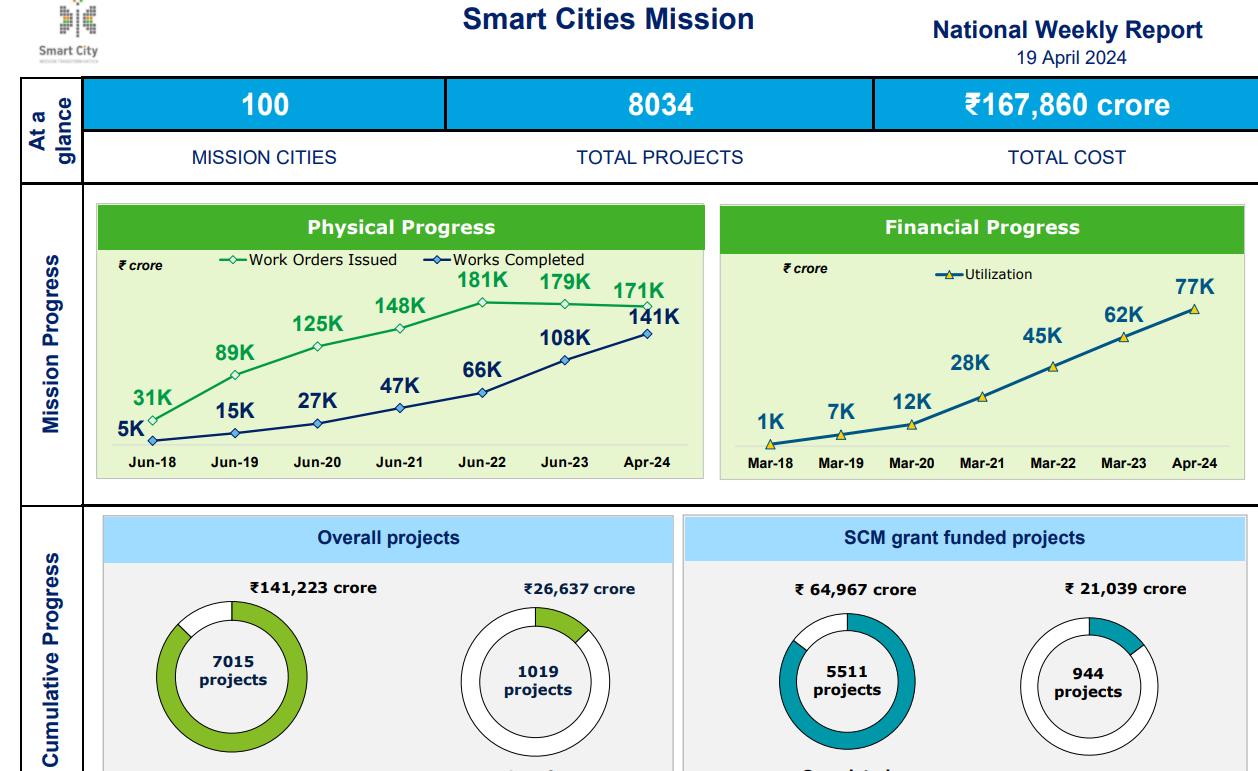 Snippet of Smart City Mission Dashboard - Source (smartcities.gov.in)
Snippet of Smart City Mission Dashboard - Source (smartcities.gov.in)
The Smart Cities Mission in India is a transformative initiative aimed at redefining urban development by harnessing technology and innovation to improve the quality of life for citizens. Launched by the Government of India in 2015, the mission seeks to develop 100 smart cities across the country, each equipped with modern infrastructure and sustainable solutions to address urban challenges. These cities are envisioned to be centers of economic growth, innovation hubs, and models of efficient governance, promoting inclusive and sustainable development.
Through the Smart Cities Mission, India aims to utilise technology to enhance urban services such as water supply, sanitation, waste management, transportation, and public safety. By integrating smart technologies like IoT sensors, data analytics, and digital platforms, cities can optimize resource utilization, reduce environmental impact, and enhance the overall livability for residents. Moreover, the mission encourages citizen engagement and participatory governance, empowering communities to actively contribute to the planning and development process, thereby fostering a sense of ownership and pride in their cities.
Also Read: What do Smart Cities mean for Indian Realty?
Features of Smart Cities
Some typical features in Smart Cities are described below:
- Promoting mixed land use in area-based developments i.e planning for 'unplanned areas' containing a range of compatible activities and land uses close to one another in order to make land use more efficient. The States will enable some flexibility in land use and building bye-laws to adapt to change
- Housing and inclusiveness i.e expand housing opportunities for all.
- Creating walkable localities i.e reduce congestion, air pollution and resource depletion, boost local economy, promote interactions and ensure security.
- The road network is created or refurbished not only for vehicles and public transport, but also for pedestrians and cyclists, and necessary administrative services are offered within walking or cycling distance;
- Preserving and developing open spaces i.e parks, playgrounds, and recreational spaces in order to enhance the quality of life of citizens, reduce the urban heat effects in areas and generally promote eco-balance
- Promoting a variety of transport options i.eTransit Oriented Development (TOD), public transport and last mile para-transport connectivity
- Making governance citizen-friendly and cost-effective i.e increasingly rely on online services to bring about accountability and transparency, especially using mobiles to reduce cost of services and providing services without having to go to municipal Offices;
- Form e-groups to listen to people and obtain feedback and use online monitoring programs and activities with the aid of cyber tour of worksites
- Giving an identity to the city i.e based on its main economic activity, such as local cuisine, health, education, arts and craft, culture, sports goods, furniture, hosiery, textile, dairy, etc;
- Applying Smart Solutions to infrastructure and services in area-based development in order to make them better. For example, vulnerable to disasters, using fewer resources, and providing cheaper services.
Smart Cities in Karnataka
In Karnataka, cities like Belagavi, Hubli-Dharwad, Mangaluru, Shivamogga, Davanagere, Tumkur, and Bengaluru have been selected as smart cities under the Smart City Mission, and the programme aims to offer area-based development and pan-city components to address various urban challenges
The Smart City Mission in Karnataka has witnessed significant progress, with over 200 affordable housing projects planned, emphasizing inclusive development and sustainable practices. These projects, with a cost of less than Rs 100 crores per project, cover a range of initiatives from affordable housing to e-governance applications and public mobility projects. The mission's approach includes public-private partnerships (PPP) to encourage private participation and funding, ensuring a comprehensive and collaborative effort towards urban transformation. By leveraging technology, transparency, and citizen engagement, the Smart City Mission in Karnataka is not only enhancing urban infrastructure but also fostering sustainable and inclusive urban environments for its residents.
SL No | Name of SMART Cities |
1 | Belagavi |
2 | Davanagere |
3 | Hubli-Dharwad |
4 | Mangaluru |
5 | Shivamogga |
6 | Tumakuru |
Also Read: Bhoomi RTC Karnataka 2024: Know About Online Village Land Records & Pahani Reports
Salient Objectives of Smart Cities in Karnataka
The main aim of the Smart City Mission Program in Karnataka is to offer
- Integrated Command and Control Centres (ICCC)
- Smart roads
- E-toilets
- Non-motorised transportation planning
- Adequate water supply
- Assured electricity supply
- Sanitation, including solid waste management
- Efficient urban mobility and public transport
- Affordable housing, especially for the poor
- Robust IT connectivity and digitalization
- Good governance, especially e-Governance and citizen participation
- Sustainable environment
- Safety and security of citizens, particularly women, children and the elderly, and health and education.
Citizen online services for smart cities in Karnataka
 Citizen E-services available for Smart City Davanagaere
Citizen E-services available for Smart City Davanagaere
Smart cities in Karnataka offer a wide range of online services aimed at enhancing citizen convenience, promoting transparency, and fostering digital governance. These services are designed to streamline various aspects of urban life and empower residents to access government services efficiently. Some common online services available in smart cities across Karnataka include:
Online Payment Facilities: Citizens can pay property taxes, utility bills, and various other fees online through secure payment gateways, eliminating the need for physical visits to government offices.
E-Governance Portals: Dedicated e-governance portals provide a centralized platform for citizens to access government services, submit applications, track the status of their requests, and interact with municipal authorities.
Birth and Death Certificates: Residents can apply for birth and death certificates online, reducing paperwork and processing time. These certificates can be downloaded and printed from the comfort of home.
Building Plan Approval: Online portals enable citizens to submit building plan approvals, track the status of their applications, and receive digital approvals, facilitating smoother construction processes.
Complaint Registration and Tracking: Citizens can register complaints related to civic issues such as potholes, garbage disposal, streetlight maintenance, etc., through online platforms. They can also track the status of their complaints and receive timely updates on resolution efforts.
Public Transport Information: Smart city portals provide real-time information on bus routes, schedules, and ticketing services, helping residents plan their commutes more efficiently.
Online Grievance Redressal: Dedicated grievance redressal mechanisms allow citizens to report issues, provide feedback, and seek assistance from municipal authorities, ensuring prompt resolution of concerns.
Property Ownership Records: Residents can access property ownership records, property tax details, and land-related information online, simplifying property-related transactions and inquiries.
Smart Parking Solutions: Online platforms offer information on parking availability, parking tariffs, and digital payment options, making it easier for citizens to find parking spaces and pay for parking services.
Citizen Engagement Platforms: Smart cities often host online forums, surveys, and discussion boards to encourage citizen participation in decision-making processes, gather feedback on urban projects, and foster community engagement.
These online services play a crucial role in transforming traditional governance models, promoting digital inclusion, and building smarter, more responsive cities in Karnataka. By harnessing the power of technology, smart cities aim to enhance the quality of life for residents and create more transparent, efficient, and citizen-centric urban ecosystems.
Smart City in Karnataka: Belagavi
Belgaum, officially known as Belagavi, is a city in the Indian state of Karnataka that has been selected in the first phase of the Smart Cities Mission under India's flagship Smart Cities Mission. The city, also known as Venugrama or the Bamboo Village, is the administrative headquarters of the Belgaum division and lies in the northwestern parts of Karnataka between the border of two states, Maharashtra and Goa. Belagavi houses the Maratha Light Infantry Regimental Centre (MLIRC). It also houses the Commando Training Wing which is a part of the Infantry School, where the country's infantry commandos are trained in endurance, escape and evasion, guerrilla and commando warfare techniques and to live off the land.
The Smart City project in Belgaum was officially launched on June 25, 2016, with a five-year timeframe to become a smart city by June 20213. The project has received an allocation of approximately 850 crores, with the original plan aiming to complete all works within five years. However, the deadline has been extended to June 2024 due to delays in project completion. Despite the extension, several crucial projects, such as the construction of a multi-purpose commercial complex at the Kalamandir site, the development of the city bus stand, the establishment of a commercial center at Tilakwadi, and the various works at vaccine depot, are still pending. The Belagavi Smart City Department is preparing for the upcoming visit of a central team to inspect the progress of the project, but it is unlikely that all pending works will be completed before the team's arrival
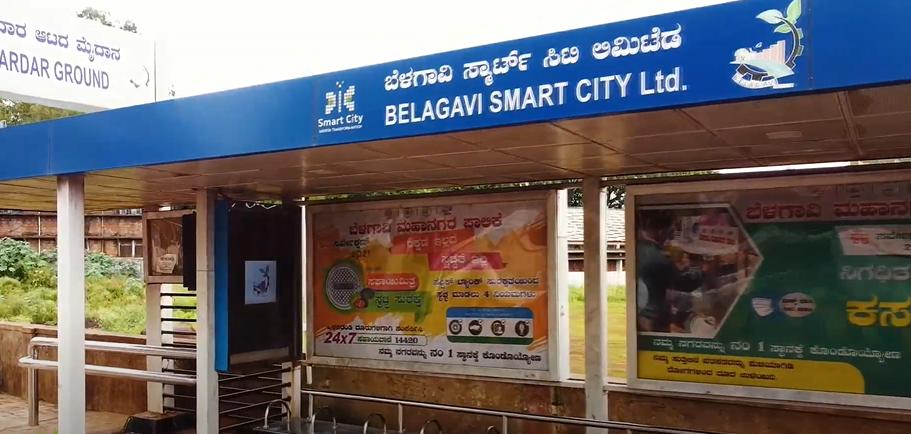 Bus Stand in Belagavi Smart City (Source smartcities.gov.in)
Bus Stand in Belagavi Smart City (Source smartcities.gov.in)
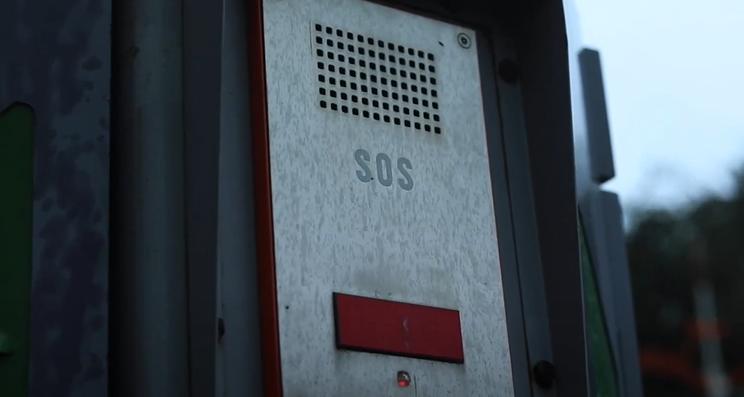 Panic Button in Belagavi, Karnataka (Source smartcities.gov.in)
Panic Button in Belagavi, Karnataka (Source smartcities.gov.in)
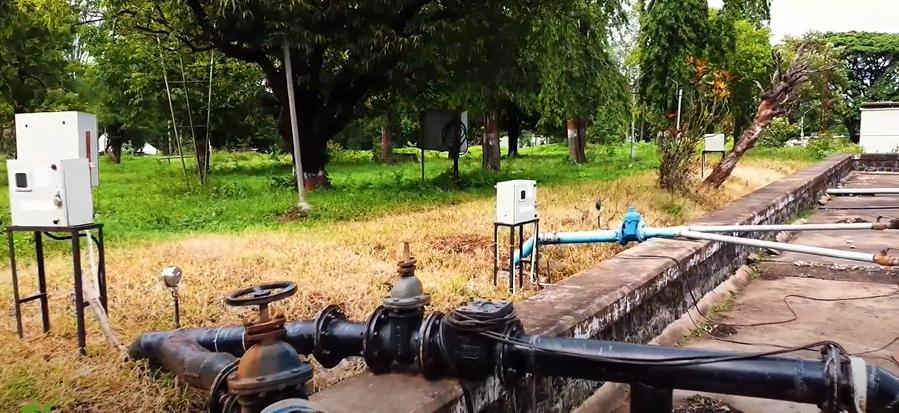 Smart Water Systems (Source smartcities.gov.in)
Smart Water Systems (Source smartcities.gov.in)
Smart City In Karnataka: Davanagere
Davanagere, a city in the Indian state of Karnataka, is one of the seven cities selected for the Smart City Mission.
The city of Davanagere is located at a distance of about 260 km from the state capital, Bengaluru. Davanagere District is surrounded by Chitradurga, Bellary, Shimoga, Chikmagalu, and Haveri districts. Davanagere district was formed in 1997 after separating from the districts of Chitradurga with Davanagere City Municipal Council as its administrative capital. It was upgraded to a City Corporation in 2007
The Bengaluru Pune National Highway which is part of the golden-quadrilateral network passes through the city. Davanagere population has increased from 3,63,780 in 2001 to 4,35,172 in 2011, at a compound annual growth rate of 1.81 percent. The average population density is 6,044 persons per sq.Km
This city has famous tourist places like Kunduvadakere, Bathigudda, Eshwara temple at Anekonda etc. An industrial town renowned for its Cotton mills was once known as Manchester of Karnataka. Presently, The city economy is mainly driven by agriculture-based food processing industries viz., Puffed rice industries, Groundnut oil extraction units etc. Besides this, Davanagere City has also developed as an education hub with the spurt of higher educational institutions of international standards.
With 13 pending projects worth Rs 291.9 crore, the city is facing challenges in obtaining site clearances and completing projects within the stipulated time. Despite these challenges, Davangere Smart City Limited has taken up significant projects, including the construction of a barrage on the Tungabhadra River and the renovation of the KSRTC bus stand, each estimated to cost Rs 100 crore. The barrage project aims to provide a reliable water supply to the city, while the bus stand renovation aims to improve public transportation infrastructure.
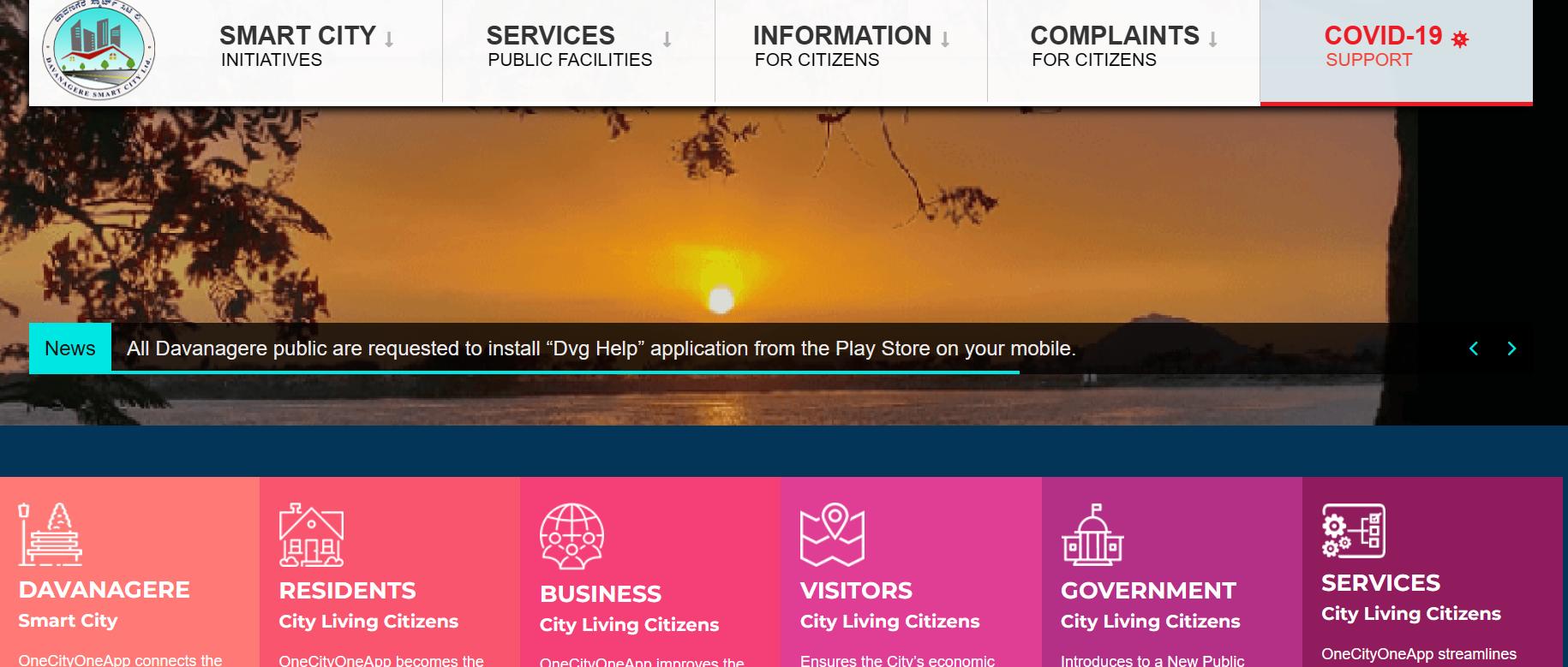 Official Website of Davanagere
Official Website of Davanagere
Smart City in Karnataka: Hubli-Dharwad
Hubli-Dharwad, another city in Karnataka, has completed 57 of the 62 projects under the Smart City Mission, with the remaining projects, such as the construction of a sports complex, green mobility corridor, and others, expected to be completed by February 2024. However, concerns have been raised about the quality of construction of projects completed under the Smart City in Hubballi-Dharwad. The city has implemented various projects, including the development of a smart road, smart classrooms, and the installation of smart poles and surveillance cameras, to enhance the quality of life for residents and promote sustainable urban development.
Official website: https://www.hubballidharwadsmartcity.com/
Smart City in Karnataka: Mangaluru
The Smart city project of Mangaluru focuses on the development of waterfronts, roads & improvement of fisheries to promote trade and thus help in improvement of the economy. Being a coastal city, waterfront development aims at connecting communities to water.
Mangaluru, has 23 pending projects worth Rs 583.37 crore, the highest among the seven cities selected for the Smart City Mission. Out of these, 10 projects are related to water-front development and upgradation of water jetty and water sports park, requiring permission from the Coastal Regulation Zone (CRZ). Apart from this projects like Smart Sports, Waterfront and Lake development, A smart market which will see the re-construction of the Central Market building at Hampankatta to a modern market complex at an estimated cost of INR 145 crore under Smart City Mission.
The city has implemented various projects, including the development of a smart city command and control center, smart parking, along with the installation of smart streetlights, E-smart schools, reconstruction of the clock tower junction, reconstruction of a pedestrian plaza, and many more such projects to enhance the quality of life for residents and promote sustainable urban development.
Official website: https://mangalurusmartcity.net/
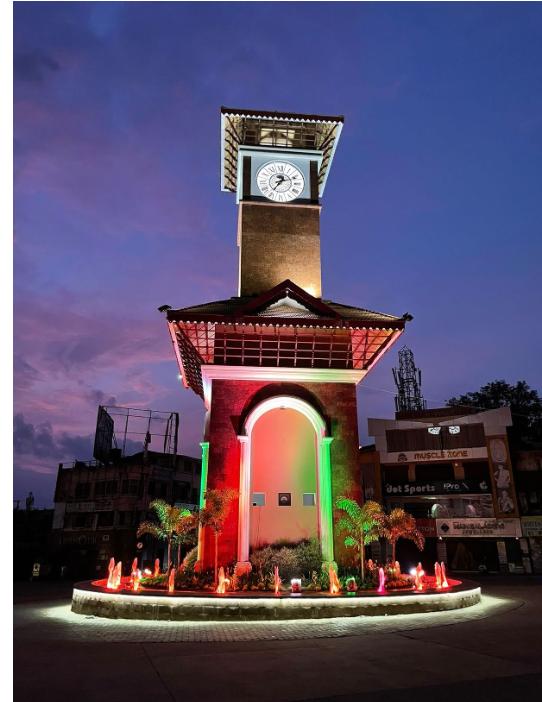 Clock Tower Junction, Part of Smart City Initiative, Source (
mangalurusmartcity.net)
Clock Tower Junction, Part of Smart City Initiative, Source (
mangalurusmartcity.net)
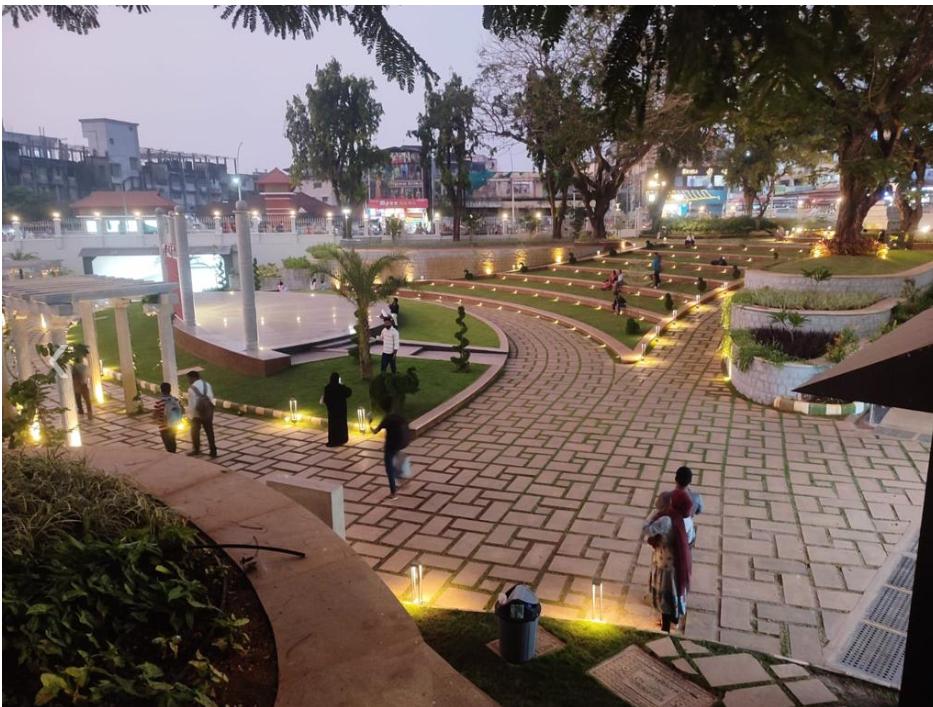 Pedestrian Plaza, part of Smart City Initiative in Mangaluru, Source (mangalurusmartcity.net)
Pedestrian Plaza, part of Smart City Initiative in Mangaluru, Source (mangalurusmartcity.net)
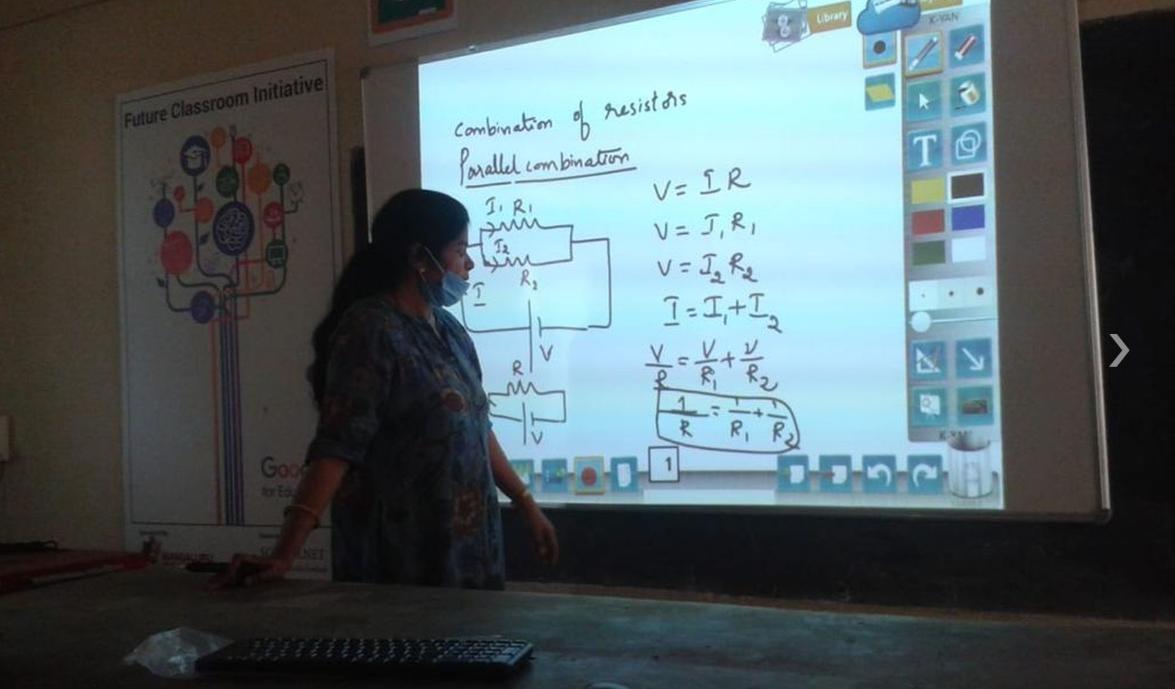 E-Smart Schools in Mangaluru Smart City, Source (mangalurusmartcity.net)
E-Smart Schools in Mangaluru Smart City, Source (mangalurusmartcity.net)
Smart City in Karnataka: Shivamogga
Shivamogga, a city in Karnataka, has developed conservancy lanes by taking up concrete flooring and storm-water drain development along the lanes, creating civic amenities like food courts and parking slots. The city was selected for the Smart City project in October 2016, and as of 2023, 53 works have been taken up at a cost of around Rs 970 crore in the first phase. The city has implemented various projects, including the development of a smart city command and control center, smart parking, and the installation of smart streetlights, to enhance the quality of life for residents and promote sustainable urban development.
Official website: https://shivamoggasmartcity.com/
Smart City in Karnataka: Tumakuru
Tumakuru, a city in Karnataka, has nine pending projects worth Rs 132.18 crore under the Smart City Mission. The city has taken up various projects, including EWS housing, open spaces, and riverfront development projects, under the Smart City Mission. The city has implemented various projects, including Integrated City Management and Control Center,
the development of a smart city command and control center and intelligent transport system , smart parking, and the installation of smart streetlights, to enhance the quality of life for residents and promote sustainable urban development.
These cities in Karnataka are making significant strides in their development as smart cities, despite facing challenges in project completion and obtaining necessary permissions. The implementation of smart city projects is expected to enhance the quality of life for residents, promote sustainable urban development, and attract private investment in these cities.
Official Website: https://smartcitytumakuru.in/NewTemplate/AboutUsNew.aspx
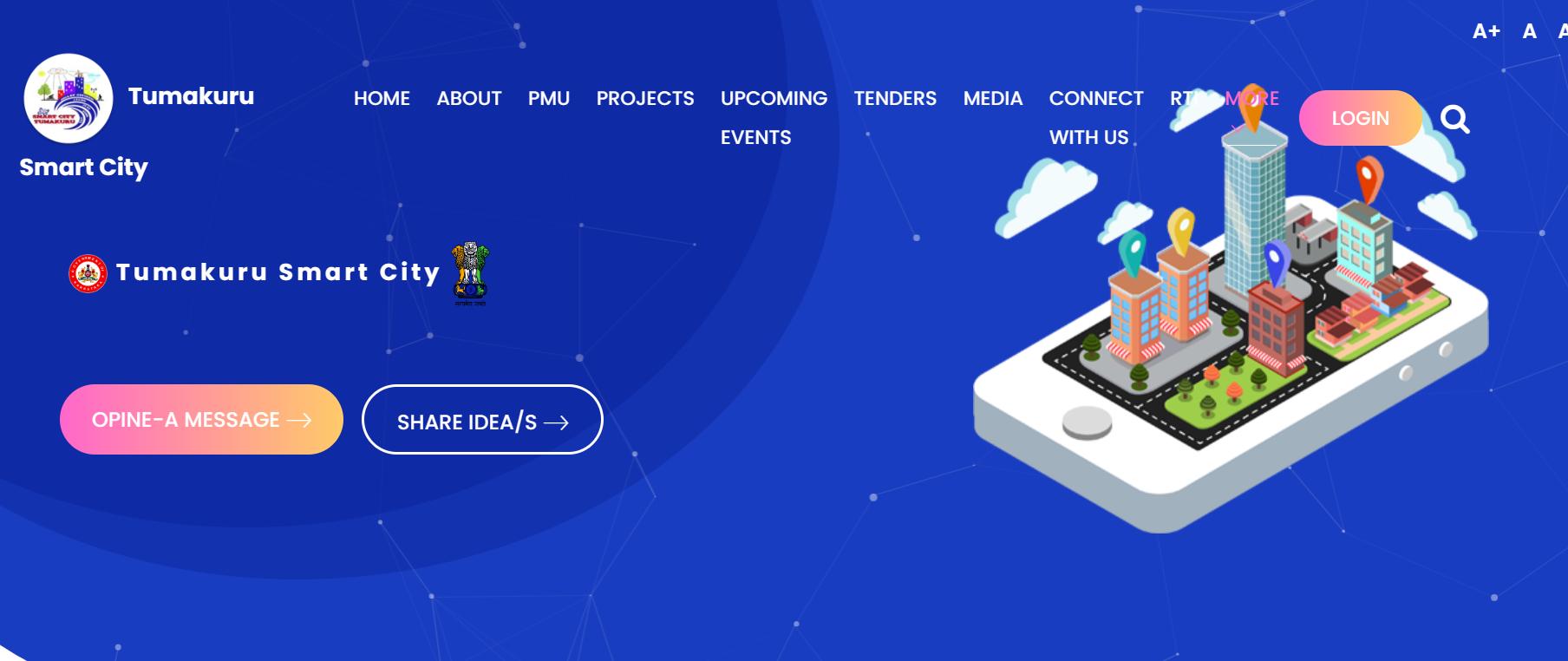 Official Website of Tumakuru Smart City
Official Website of Tumakuru Smart City
Conclusion
The Smart Cities Mission in India represents a monumental effort towards transforming urban landscapes into hubs of innovation, sustainability, and inclusive development. In Karnataka, cities like Belagavi, Davanagere, Hubli-Dharwad, Mangaluru, Shivamogga, and Tumakuru have embraced this mission, each with its unique set of projects aimed at enhancing urban infrastructure and services. Despite facing challenges such as delays in project completion and obtaining necessary permissions, these cities have made significant progress in implementing smart city initiatives.
From promoting mixed land use to fostering citizen-friendly governance and embracing smart solutions for infrastructure, these cities are redefining urban living. Through the Smart City Mission, Karnataka aims to address key urban challenges while creating vibrant, sustainable, and technologically advanced urban centers. With a focus on citizen engagement, transparent governance, and private sector participation, these cities are laying the foundation for a brighter and smarter future.
As these cities continue their journey towards becoming smart cities, it is crucial to address challenges effectively, ensure timely project completion, and prioritize the needs of citizens. By leveraging technology, innovation, and community participation, the smart cities of Karnataka are poised to emerge as models of urban development, setting the stage for a more prosperous and sustainable future for all residents.
explore further
Latest from Did you know?
More from Interactions
Resources
Dwello, for every home buyer, is a way to go from 'I feel' to 'I know', at no extra cost.


